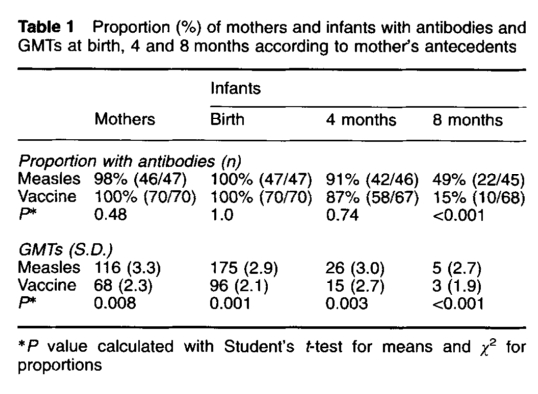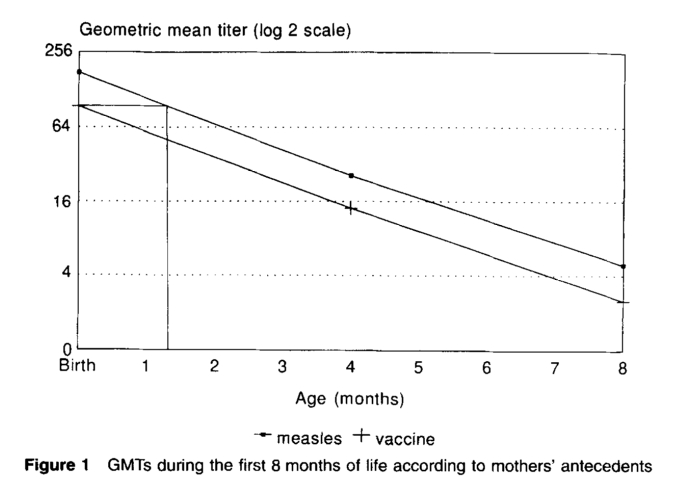This is the second part of the article on measles in the first year of life. The first part is "Measles in the first year of life - The impact. "
In the last months before birth to the child's mother sends antibodies for most of the diseases that she had until then or has been vaccinated against whom. In this way the child is protected in the first months of life.
The level of maternal antibodies against measles that the child receives is lower if the mother had been vaccinated compared to what is sent if the mother had had measles.
This fact is the vaccinia an argument with which they are trying to convince parents not to vaccinate their children.
Let's now part of the quotation from the book "Children supervaccinati" dr. Serravalle I cut the first part of this article " Measles in the first year of life - the impact "
---------------- ----------------------------------------
Before continuing with the reading of 'article, I inform you that since 10.1.11, the Veneto Region has developed an online questionnaire for parents about vaccinations.
Please participate and run the link as much as possible.
----------------------------------------------- ---------
Il dott. Serravalle scrive quindi che " A 8 mesi di età, il 49% dei bambini nati da madri che avevano avuto la malattia naturale, presentava ancora anticorpi, contro il 15% dei bimbi nati da madri vaccinate" comparing the level of antibodies against measles in infants whose mothers had had the disease naturally with those of infants whose mothers had been vaccinated, there is an obvious difference. At 8 months of age, 49% of children born to mothers who had had the disease naturally, it still had antibodies, compared with 15% of babies born to mothers vaccinated. (1)
Another study found that the antibody level in vaccinated women is half that recorded after passing the infection naturally. (2) (3)
(1) Serres GD, Jolyf JR, MB, N. Boulianne Passive immunity against measles during the first 8 months of life of infants born to vaccinated mothers or to mothers who sustained measles. Science. 1997;15(6):620-623.
(2)Nates S.V., Giordano M.O. et al., Loss of maternally derived measles immunity in Argentinian
infants, “Pediatr Infect Dis” 1998;17:313-6.
(3)Nates S.V., Cumino A. et al., Measles antibody in pregnant Argentinian women relative to vaccine-induced immunity and natural infection, “Pediatr Infect Dis” 1999;18:937-39.
e come riferimento indica "Passive immunity against measles during the first 8 months of life of infants born to vaccinated mothers or to mothers who sustained measles"
Vorrei far notare alcune cose:
1) Questo studio non dice che a 8 mesi il 49% e il 15%, rispettivamente, si è trovato un livello protettivo di anticorpi, ma solo che erano ancora rilevabili. Per essere precisi, nei bambini di madri che avevano avuto il morbillo 5 GMTs (at birth were 175) and in those of mothers immunized 3 GMTs (at birth were 96).
2) To note is that even in children of mothers vaccinated, 51% had no detectable antibodies to 8 months, then more than half of them were no longer protected for a few months before the vaccination.
3) The study authors found a difference of 1.5 months, ie children born to mothers vaccinated antibodies lost a month and a half of those mothers who had measles. This small difference can be explained by the fact that probably vaccinated mothers had had contact with the virus morbillo che gli è servito come booster naturale e suppongono che in paesi come gli USA dove il virus non circola più, la differenza potrebbe essere più grande di 1,5 mesi. Ma rimane comunque il fatto che anche i bambini delle madri che avevano avuto la malattia erano a rischio di morbillo a partire da alcuni mesi prima della vaccinazione. Questo viene anche confermato dai dati epidemiologici che avevo riportati nella prima parte dell'articolo.
Se si fa una ricerca su Pubmed si trovano molti studi che indagano su questo problema. Ma lo scopo non è quello di convincersi che il vaccino è dannoso perché i bambini di madri vaccinate ricevono less antibody.
These studies do, however, is to find the optimal age at which vaccination of young children!
In the first six months and a bit 'in the second half of the immune system of children is not yet able to develop a good immunity in response to this type of vaccine and maternal anticopri immediately destroy the virus attenuated vaccine. In the second half of the main reason for the failure of vaccination is the interference of maternal antibodies and also for a while 'still affects the immaturity of the immune system.
In practice, even when the level of these antibodies is not high enough to protect dalla malattia, è abbastanza alto da rendere inefficace il vaccino. Se si vaccinassero tutti i bambini in questo periodo di transizione, una certa percentuale di loro non svilupperebbe nessuna immunità. Questo è il motivo per cui si raccomanda la prima vaccinazione tra 12 e 15 mesi. A quest'età solo ca. il 5% dei vaccinati fa parte dei non risponder. E questo è anche il motivo per cui si fa una seconda dose più tardi, perché nel frattempo quasi tutti quelli che a 12-15 mesi erano stati vaccinati senza successo, sviluppano un'immunità dopo aver ricevuto la seconda dose. Con questa strategia si protegge ca. il 99% dei bambini. Infatti è molto raro che in un'epidemia si ammalano persone che erano state vaccinate due volte contro il measles. I'm that 1% of non-responders. They are also protected by the vaccine, in an indirect way - but only if vaccination coverage is very high (95% and more) so why the virus can not circulate. In fact, vaccines have a twofold effect. That of protecting individual and civil protection. Both are important because no vaccine can offer 100% protection to the individual, but if almost everyone is vaccinated, the protection extends indirectly to persons who are not immune (non-responders, those who can not be vaccinated because of a contraindication, those who are not vaccinated because the parents refuse to protect them, those che sono ancora troppo piccoli per il vaccino etc.)
Uno potrebbe obiettare: ma allora perché non si vaccinano tutti i bambini più tardi, quando è sicuro che hanno perso gli anticorpi materni e potranno essere vaccinati con successo? In questo modo basterebbe una sola dose.
Si, si potrebbe anche fare così, solo che c'è lo svantaggio che ci sarebbe costantemente un grande numero di bambini suscettibili e molti si ammalerebbero prima di arrivare alla data della vaccinazione. Sarebbe una strategia vaccinale rischiosa.
Visto che la situazione epidemiologica e anche altri parametri variano da paese a paese, anche la migliore età della vaccinazione dev'essere adattata a quella precisa situazione. Quando in una popolazione le madri vaccinate diventano la maggioranza, l'età della prima dose di vaccino MPR (morbillo parotite rosolia) viene abbassata perché gli anticorpi sono consumati prima e non ostacolano quindi la vaccinazione. Nei paesi dove c'è un'alta incidenza di casi di morbillo e dove i bambini sono a maggior rischio di morte da morbillo non si può aspettare che i bambini raggiungono l'età in cui la maggior parte di loro può essere vaccinato con successo perché molti non arriverebbero vivi a quel momento. In questi paesi si comincia la vaccinazione di solito a 9 mesi e in caso di un'epidemia in atto già a 6 mesi.
Per esempio nel 1997 la Staendige Impfkommission (STIKO) Robert Koch Institut (RKI) has lowered the age for first dose measles with the following explanation: The
12 months of age was chosen for the first dose of measles vaccine (as MMR) for the fact that the percentage of mothers who have had measles is declining. The amount of antibodies that are transmitted via the placenta to the baby is lower than those of mothers who have had measles, and at the end of the first year of life have fallen to a level that does not hinder the success of vaccination.
Source: Beilage zum Epidemiologischen Bulletin 20/97 "Hinweise zur der Neufassung Impfempfehlungen Staendige Impfkommission (STIKO)"
STIKO The vaccine is the National Commission, responsible for the vaccination strategy in Germany.
What would happen if many more did not vaccinate their children against measles? The virus would be more ground to multiply and cause disease, more or less serious complications and even death in children in the first year of life that have not yet reached the age where they can be vaccinated. As we have seen in this section and in the first part may be affected both children and mothers of vaccinated and those whose mothers had had measles. For consideration is the fact that with modern means of medicine increasingly Premature babies can survive. I receive much less premature maternal antibodies before birth because they are transmitted mainly in the latter part of pregnancy.
long but there are pediatricians who respond as follows in their forum for mothers, unfortunately continue to see cases of measles (and also the permanent consequences of this serious disease like encephalitis, subacute sclerosing panencephalitis and death)
Dear Doctor
in school for my daughter (6 years) there is a case of measles. I am concerned that I have another child is 1 year. Some runs danger if the older sister had to be struck and transmit the disease?
Both are not vaccinated.
Thank
Answer Stefano pocket pediatrician:
not bubonic plague, is serene ... It will not happen anything


0 comments:
Post a Comment